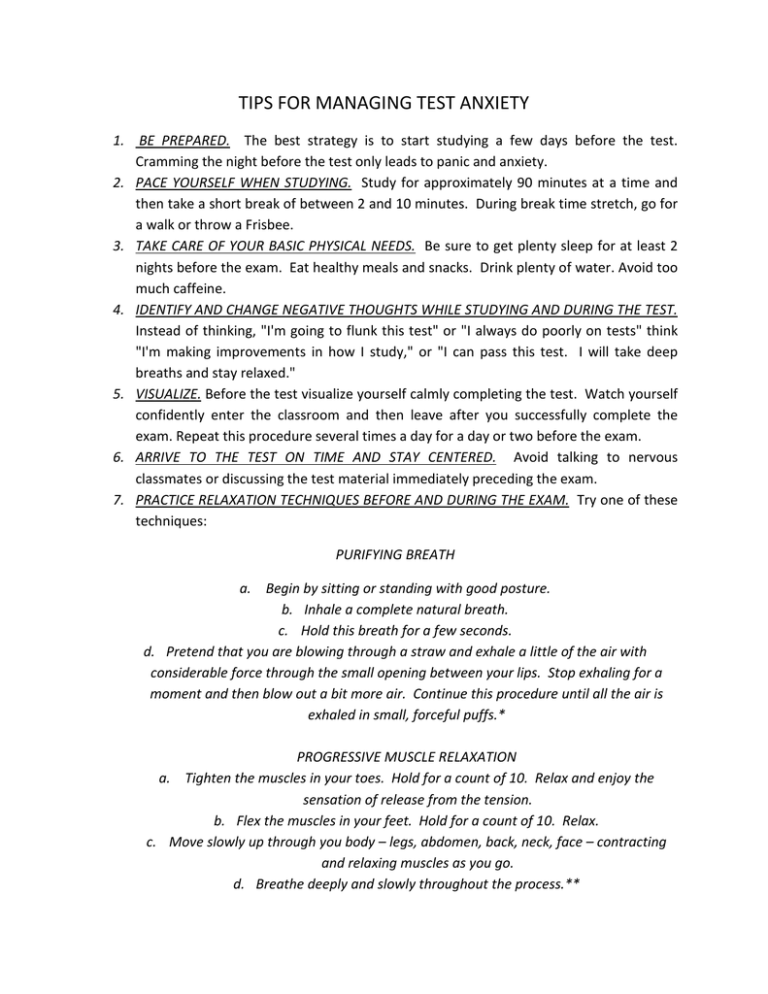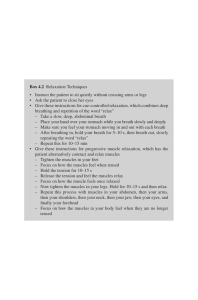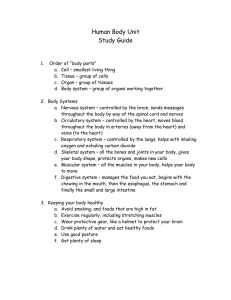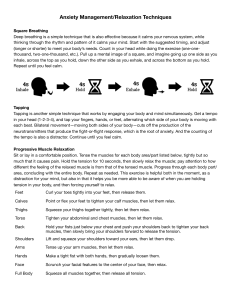TIPS FOR MANAGING TEST ANXIETY
advertisement

TIPS FOR MANAGING TEST ANXIETY 1. BE PREPARED. The best strategy is to start studying a few days before the test. Cramming the night before the test only leads to panic and anxiety. 2. PACE YOURSELF WHEN STUDYING. Study for approximately 90 minutes at a time and then take a short break of between 2 and 10 minutes. During break time stretch, go for a walk or throw a Frisbee. 3. TAKE CARE OF YOUR BASIC PHYSICAL NEEDS. Be sure to get plenty sleep for at least 2 nights before the exam. Eat healthy meals and snacks. Drink plenty of water. Avoid too much caffeine. 4. IDENTIFY AND CHANGE NEGATIVE THOUGHTS WHILE STUDYING AND DURING THE TEST. Instead of thinking, "I'm going to flunk this test" or "I always do poorly on tests" think "I'm making improvements in how I study," or "I can pass this test. I will take deep breaths and stay relaxed." 5. VISUALIZE. Before the test visualize yourself calmly completing the test. Watch yourself confidently enter the classroom and then leave after you successfully complete the exam. Repeat this procedure several times a day for a day or two before the exam. 6. ARRIVE TO THE TEST ON TIME AND STAY CENTERED. Avoid talking to nervous classmates or discussing the test material immediately preceding the exam. 7. PRACTICE RELAXATION TECHNIQUES BEFORE AND DURING THE EXAM. Try one of these techniques: PURIFYING BREATH a. Begin by sitting or standing with good posture. b. Inhale a complete natural breath. c. Hold this breath for a few seconds. d. Pretend that you are blowing through a straw and exhale a little of the air with considerable force through the small opening between your lips. Stop exhaling for a moment and then blow out a bit more air. Continue this procedure until all the air is exhaled in small, forceful puffs.* PROGRESSIVE MUSCLE RELAXATION a. Tighten the muscles in your toes. Hold for a count of 10. Relax and enjoy the sensation of release from the tension. b. Flex the muscles in your feet. Hold for a count of 10. Relax. c. Move slowly up through you body – legs, abdomen, back, neck, face – contracting and relaxing muscles as you go. d. Breathe deeply and slowly throughout the process.** If these techniques are not helpful with reducing your test anxiety, contact one of the helpful therapists at the Walter Young Center. They can be reached at (262)524-7335. Resources: Davis, Martha, Robbins, Elizabeth and McKay, Matthew, The Relaxation and Stress Reduction Workbook, New Harbinger Publications, Inc., Oakland CA, 1995.


